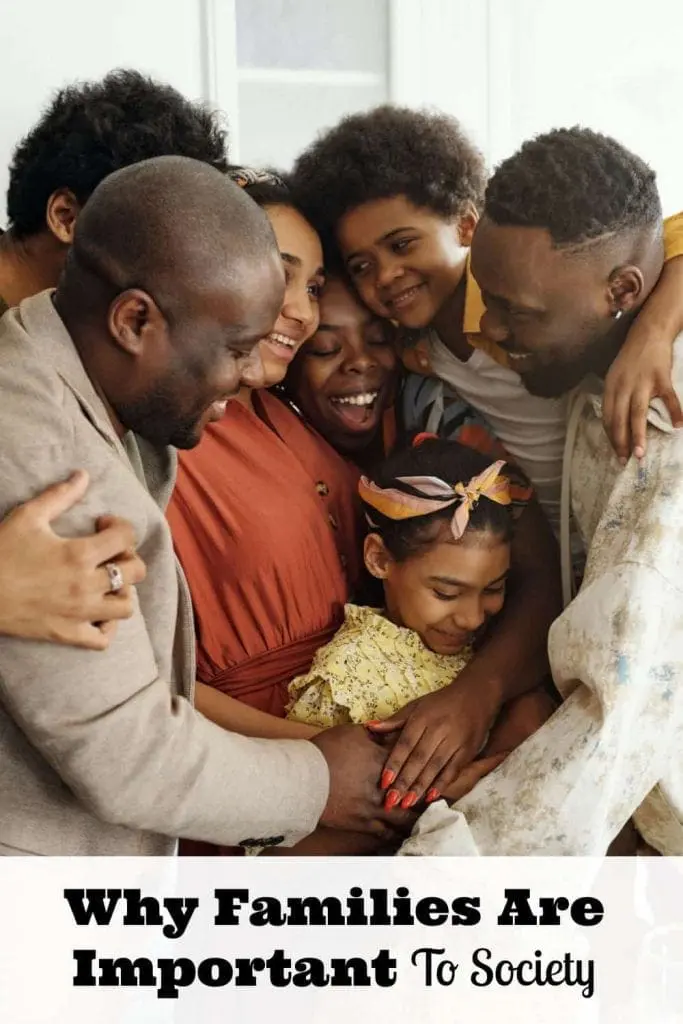Families are essentially the building blocks of society. Family units serve as the nursery for the citizens that become the population of a society. In other words, families are responsible for the development of children into adults who will later collectively be society. As each of us is influenced and formed by our surroundings, so too is our society. Because society is a larger population, it may be harder to influence and change from singular events, and yet it is a fluid thing that can be influenced for the good or the bad. Families are so important to society because they are the foundation that society is built upon. The values of the families will be reflected in society at large.
Why Is The Family Unit Important?

Why is family important? While everyone is born to a mom and dad, not everyone is born into a loving family. The lack of strong, loving families can lead to the downfall of modern society in so many ways. Being part of a family, or not being part of one, has a trickle-down effect on the decisions and actions we make. Those decisions and actions can eventually lead to problems in society if too many people are making poor choices that don’t benefit the group as a whole.
Why are families important to individuals and society? The role of the family in society is to establish a sense of belonging within in children. In fact, many families are researching how to make money online for beginners because they want to prioritize being present with their children. Through this primary function of the family, children can learn social skills. This helps them learn to interact and work together for the betterment of all. With this foundation of caring for themselves and others, families are also responsible for educating children and instilling family values. This creates citizens who are working to reach goals in civic ways.
The Role Of Family In Society
The family is considered as the core of the society because it is the place where its members are most personally affected. This is the easiest place to instill values and create change. When families believe they can achieve and help others and lift each other up to prosper and reach greater heights, society can do great things. On the other hand, if the families are held down in an abject state of poverty and despair, the society will not prosper. The impact of family on society is small when you speak of only one family. However, it is huge when you speak of families collectively. And because we all influence each other in our connected communities, we can all make a positive difference. The role of family in society is to create the foundational building blocks that shape the future of our society.

The Importance Of Family In Society
The family unit plays an important role in making us better people individually as well as better citizens of our society. The importance of the family in Western Culture has a long history and it is part of our social identity. Families are a major source of practical support on a daily basis. The end result of this is greater social stability and less poverty. The impact of family on society should not be underestimated.
Family Set Us Up for Future Relationships
As part of a nuclear family, children learn how to interact in an appropriate manner with their parents and siblings. A child’s first relationships often serve to set their expectations in life. These are life lessons they later take out into the world and use in their relationships with employers, friends, significant others, and even strangers. These familial relationships often form the basis for how people will interact with society. They affect the relationships they will form as members of the community. A strong family unit will teach them to value each other through differences and to work together to accomplish mutual goals. The importance of family here is to make sure we don’t become solitary creatures who are so withdrawn that we can’t communicate, trust, or work well with others. We have to learn that relationships with other people can be enriching and rewarding.
Families Provide a Safe Zone
Family is important in providing a sense of security. A strong, loving family structure provides a place where children can feel safe. Kids will be comfortable to be who they are and know they’ll be loved and supported. Kids have a place to go when they’re dealing with a crisis and need help. They feel encouraged and have more confidence in themselves because they know they’re loved and appreciated. Young people learn to give and receive emotional support.
Strong family relationships provide a stable environment and moral support. When people are functioning out of a level of safety, they will make more civic minded decisions than when they are functioning out of a level of survival. With the support of family, individuals can succeed and accomplish greater things for themselves and their community or country.
Families Teach Us How to Be Part of Something
Through family traditions, connections, and a sense of responsibility, families teach us to love and support others. Families teach us not to focus solely on ourselves. Being part of a family group teaches you how to be part of something bigger than yourself. It also teaches you how to accept people who are different from you.
This is a super important lesson because selfish people do not make good family members or good members of a society. When they are stuck focusing solely on their own well-being, they will miss the larger picture of how much more can be accomplished for everyone as a team.

Good Family Relationships Are Linked to Better Mental Health
Many studies have shown a direct correlation between family time and a child’s mental wellbeing. The more time a child has with their family, the lower their risk of depression. Healthy family relations have a positive effect and can encourage mental well-being. However, negative family relationships can trigger mental health issues. Close relationships provide a stable family life that helps the child’s life feel more safe and stable.
When families help children establish healthy coping mechanisms and healthy practices such a exercise and mindfulness, they are helping the individuals build resilience. Furthermore, resilient individuals helps the society have resilience too.
Families Teach Us Values
When children are part of a loving family that teaches discipline and family values, they learn right from wrong and become ingrained with strong values. These strong family values become the foundation of their identity. They’re so much a part of who they are. Our values teach us how to treat other people, respect ourselves, and find our purpose.
For example, if in our own families we teach equality of individuals and responsibility of individuals. These are also values that we will work to uphold in society. Families themselves are in fact a social institution that we can choose to value and support for our greater good. Married couples can usually offer greater financial support and devote more time to the socialization of children.
Families Are the Strength of Our Society
Strong families lead to strong communities and strong communities lead to a strong society. It’s a domino effect that starts in the home and extends outward into our communities. When we have strong family support, we are more likely to fill our basic needs. This allows us to be stronger more productive members for the continuation of society.
As the International Federation for Family Development says, family is the, “environment where ethical and cultural values are achieved in a natural way.” Further, they state, “Taking into account the broad experience of our Federation in dealing with families worldwide, we see every day that family is where the vast majority of people learn the fundamental skills for life.”
Conclusion
Importance of family is paramount. Families are important to society because they are the foundation of a civilization, social relationships, and the values of a population. There is no question that it is an essential institution.
How do families benefit society? Happy, healthy families lead to individuals who are a contributing part of society. They have a support system to help build each other up. On the other hand, people raised in an unhealthy home environment struggle to be part of society. It hard for them to find their place in the world. They tend to struggle with social relationships and often substance abuse. The makeup of the societal family units has profound effects on the values and actions of the whole.
Strong, healthy, happy families are a necessity to society. They teach us how to be part of our community, give back, and be our best selves. When we can do that, we can build a strong society and civilization. In what ways do you think families have an important influence on society? Do you think the important functions of the family are clear to the younger generation?
Check out my latest book, Welcome To The Family! through my Affiliate Amazon link.
Related Posts:
What It Means To Be Family Oriented
10 Characteristics Of A Role Model

Sarah says
The answer to why family is important lies largely in life-long support and nurturing. Family provides emotional, mental, and sometimes financial support, offering a sense of security and stability. They nurture and care for each other during difficult times and help support each other to reach higher goals. I once saw this activity where they asked people to step forward if they had ever had help with various things. It was easy to see that someone without family would naturally be way behind.
Additionally, interactions with family members contribute to emotional well-being, providing opportunities for companionship, socialization, and the development of social skills. All of these help us to be comfortable and successful in everyday life for as long as we live.
Haniya says
Families are important because they play a crucial role. Healthy family relationships make people ready to contribute to society instead of drain it. Functioning well-adjusted adults are the fundamental unit of society and these are formed through supportive families.
Importance of family in the society is that we learn to interact and function as part of groups instead of independently and on our own which would lead to no society at all, rather anarchy.
Ike Mceach says
The importance of family to the country is self-evident. Society is composed of a stable small family, and socialization is a fundamental attribute of human beings. People create value and promote social development, while social development in turn promotes stable income growth and development of families. The two are mutually reinforcing!
Debbie says
I really enjoy reading family topics on site. It holds so many wonderful posts. “We find comfort among those who agree with us–growth among those who don’t.” by Frank A. Clark.
Clay Vibes says
Great post, very insightful! At Clay Vibes, we craft eco-friendly clay utensils that blend tradition with wellness. Love seeing more people appreciate sustainable living visit our website : clayvibes.world
Lily Jane says
This is such a vital and beautifully articulated perspective. Families are indeed the foundational unit of society, teaching empathy, cooperation, and core values that ripple outward into our communities. They provide the essential support system that allows individuals to thrive and contribute positively. This piece is a powerful reminder of their irreplaceable role in creating a stable, compassionate world. Thank you.
Koupons FR says
What a beautiful and important topic! Families are the foundation of our society, shaping our values and fostering a sense of community. On Koupons.fr, we’re dedicated to helping French families save on all their daily essentials.
Pankaj says
In places with large expat populations like the UAE, the legal framework is what makes it possible for families to stay together and build a stable life. Things we often take for granted, like sponsoring a spouse and children on a family visa or rights to maternity and paternity leave, are all defined by labour and residency laws. These regulations are the practical tools that allow families to contribute to society.